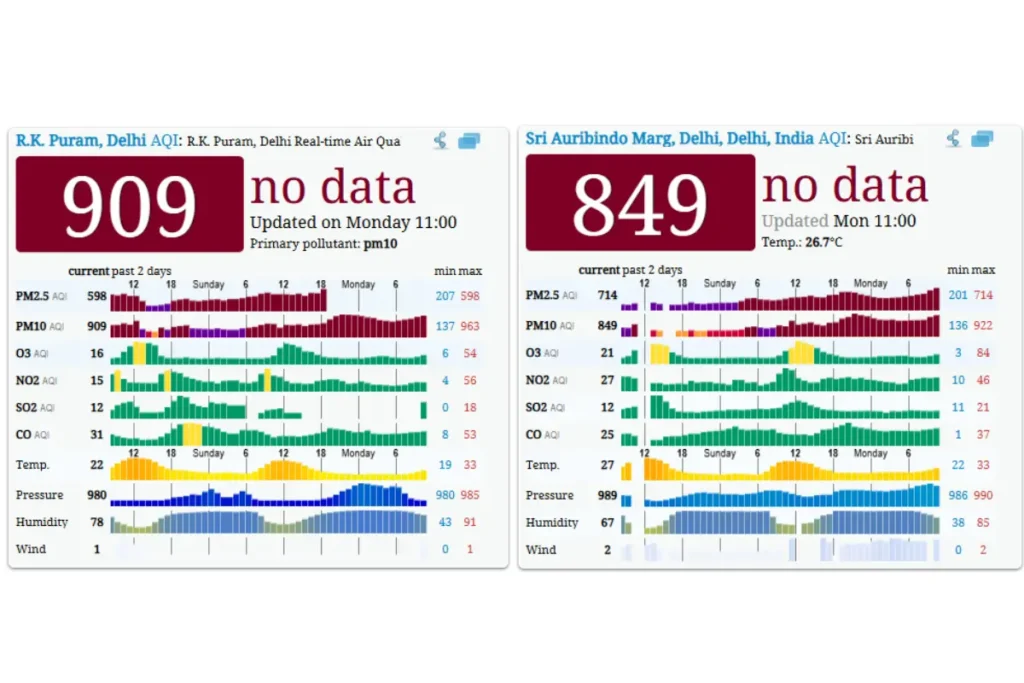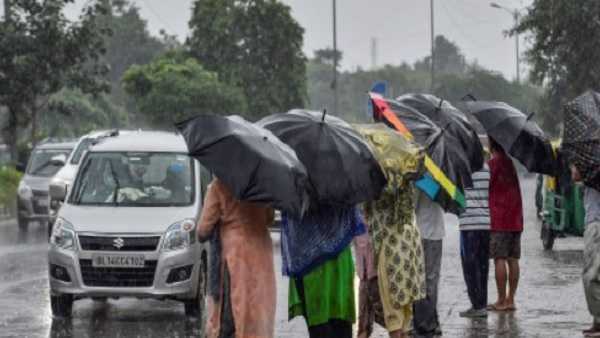Delhi NCR Air Pollution: The air in Delhi-NCR has turned into a toxic haze, with the Air Quality Index (AQI) climbing to hazardous levels, leaving residents grappling with health risks. The dense smog has reduced visibility to alarming levels, and the Indian Meteorological Department (IMD) has issued an orange alert for the region. In response, the Graded Response Action Plan (GRAP) Stage 4 has been implemented, bringing several restrictions into effect. Here’s everything you need to know.
AQI in Delhi-NCR: Alarming Numbers Signal Danger

According to ‘aqicn,’ as of Monday, AQI levels in Delhi have surged past 800 in several areas, a figure classified as “hazardous” by air quality standards.
- R.K. Puram recorded an AQI of 909.
- Sri Aurobindo Marg reported 849.
Such levels of pollution pose severe health risks, especially for children, the elderly, and individuals with respiratory conditions. According to environmental experts, the worsening air quality is a result of a deadly mix of local emissions, stubble burning in nearby states, and unfavorable weather conditions trapping pollutants close to the ground.
GRAP Stage 4: What’s Restricted in Delhi?
With GRAP Stage 4 in place since Monday morning, authorities have introduced stringent measures to curb pollution:
- Construction Ban: All construction and demolition activities, including highways, flyovers, and pipeline projects, have been halted.
- Truck Entry Restrictions: Only CNG, BS-VI, electric, and essential service trucks are allowed entry into Delhi.
- Traffic Curbs: Light commercial vehicles registered outside Delhi are restricted unless they meet CNG or BS-VI standards.
- School Closures: Physical classes for students up to Class 9 are suspended, with online classes replacing them.
Delhi Chief Minister Atishi emphasized that these measures are critical for safeguarding public health, urging compliance and cooperation from residents.
Schools Go Virtual Amid Health Concerns
With thick smog enveloping the city, schools have been directed to suspend physical classes for younger students. Online classes are now the norm for students up to Class 9, while senior students in Classes 10 and 12 continue in-person learning with precautions.
Smog Disrupts Trains and Flights in Delhi NCR
Dense fog, with visibility dropping to as low as 100 meters in some areas, has caused chaos in transportation.
- Over 160 flights were delayed at Indira Gandhi International Airport by Monday morning.
- More than 28 trains arriving at New Delhi and Anand Vihar stations reported delays ranging from 2 to 9 hours.
The IMD classifies visibility below 200 meters as “dense fog,” a condition worsened in Delhi by smog, a mix of fog and pollutants.
Haryana Sees AQI Improvement, Rajasthan Struggles with Critical Levels
Air quality in Haryana showed improvement on Sunday, with AQI levels falling into the ‘poor’ or ‘moderate’ categories, as per the CPCB’s evening bulletin. No district was listed in the ‘very poor’ or ‘severe’ zones. Despite this, schools up to Class 5 remain closed in the state. In Rajasthan, pollution levels remain critical. Jhunjhunu recorded the highest AQI of 441. Other red-zone areas include Churu (463), Bhiwadi (432), Sikar (392), and Bikaner (346).
IMD Forecast and Air Pollution Outlook
Weather experts warn that a significant reduction in pollution may require rainfall, which is unlikely this month. The IMD has predicted clear skies dominated by smog for the next seven days, accompanied by a gradual dip in temperatures.
- Air quality is expected to remain in the ‘very poor’ category for at least six days, as per the Indian Institute of Tropical Meteorology.
- Weather conditions, including low wind speeds and high humidity, are not conducive to pollutant dispersion, prolonging the current crisis.
How to Stay Safe Amid Dangerous Air Quality
Residents are advised to take the following precautions:
- Stay Indoors: Limit outdoor activities, especially during the morning and evening hours when smog is densest.
- Use Air Purifiers: Invest in air purifiers for indoor spaces.
- Wear Masks: N95 or similar masks can help reduce exposure to harmful particles.
- Hydrate Well: Drinking water helps flush out toxins.
Keep watching our YouTube Channel ‘DNP INDIA’. Also, please subscribe and follow us on FACEBOOK, INSTAGRAM, and TWITTER.











Discussion about this post